

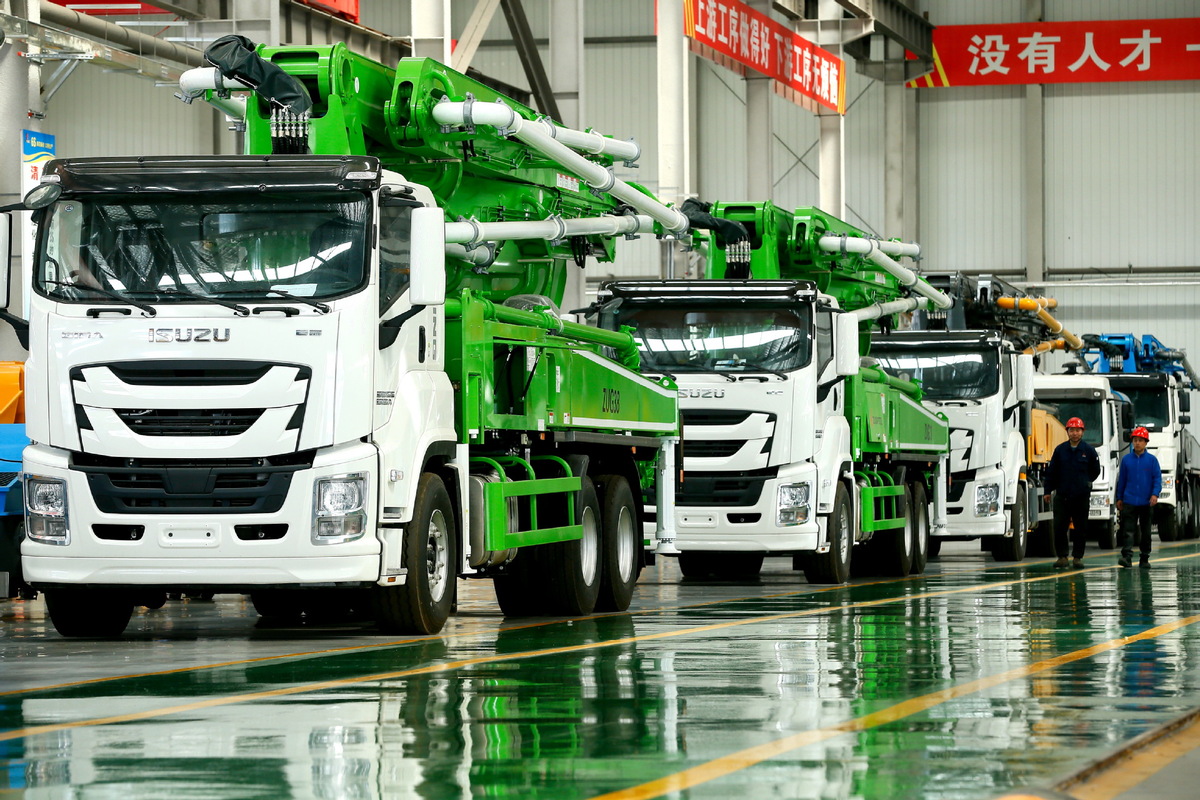 Concrete pump trucks are ready to be exported to overseas markets at Qingdao Jiuhe Heavy Industry Machinery Co Ltd in Jimo district, Qingdao, Shandong province, on April 21, 2024. [Photo/Xinhua]
Concrete pump trucks are ready to be exported to overseas markets at Qingdao Jiuhe Heavy Industry Machinery Co Ltd in Jimo district, Qingdao, Shandong province, on April 21, 2024. [Photo/Xinhua]
Heavy vehicle manufacturers in Qingdao, Shandong province, are accelerating scientific and technological innovation, enhancing the competitiveness of independent brands and expanding the overseas markets.
Workers at Qingdao Jiuhe Heavy Industry Machinery Co Ltd, a heavy equipment manufacturer based in Jimo district, Qingdao, are busy assembling concrete pump trucks, ladder lift trucks and other heavy vehicle products to meet overseas orders.

Two voice actors of Tian Xiwei and Yu Shi in Howl’s Moving Castle Photo:IC
A total of 11 films are set to hit cinemas during the upcoming May Day holidays from May 1 to 5. The ticket pre-sales during the May Day holidays had surpassed 30 million yuan ($4 million) as of Monday morning, with
Formed Police Unit, China’s first film based on China’s peacekeeping police, topping the highest-grossing pre-sale list, according to Chinese ticketing platform Beacon. Film insiders and analysts predicted that the total box office of the film season will reach 1.3 billion yuan.
Traversing multiple genres, the 11 films cover action, suspense, comedy, animation, and romance. Industry insiders told the Global Times that these films are very competitive.
Zhang Tong, a senior data analyst at ticketing platform Maoyan, told the Global Times on Monday that the new releases during each have their own unique characteristics and corresponding audiences.
He added that some films are relatively close in pre-sale earnings, and the final box office performance will still depend on the subsequent promotional reach and post-screening word-of-mouth.
“Based on current data, the total box office for the five-day holiday is expected to range around 1.3 billion yuan ($179.46 million),” he said.

A scene from the Howl’s Moving Castle Photo:IC
Highlighted live-action films
Formed Police Unit, starring leading Chinese actors Wang Yibo and Huang Jingyu, is the first commercial film focusing on China’s peacekeeping polices overseas. It tells the story of China’s peacekeeping police officers undertaking a sacred mission, traveling to foreign countries, and carrying out tasks in war-torn areas.
Media sources reported that, to present the real experiences of Chinese peacekeeping police in the mission area, the production team referenced a large quantity of documentary materials, crafting the scenes, props and environment as close to reality as possible.
The suspenseful comedy
Nothing Can’t be Undone by a Hotpot is currently ranked the second-highest-grossing film in the pre-sale list. The film combines comedic elements with the rising trend of script-killing suspense in recent years, cleverly integrating excellent traditional Chinese culture such as Sichuan opera and hotpot.
Action film
Twilight of the Warriors: Walled which was shortlisted for the Cannes Film Festival, brings together Hong Kong actors, including Louis Koo and Sammo Hung.
The plot follows troubled youth Chan Lok-kwun as he accidentally enters the Walled City, discovers the order amid its chaos, and learns important life lessons along the way.
Shi Wenxue, a film critic based in Beijing, told the Global Times that the schedules for various films are actually more diverse in terms of genres. Meanwhile, the “blockbuster effect” is becoming more evident in the Spring Festival and summer vacation periods.
But this year’s May Day movie lineup relatively lacks “blockbuster films,” and the highlights are also relatively average, so the expectations might not be as high as in 2023.
Hit animated film
According to Maoyan, the most-anticipated films are Japanese animated films
Howl’s Moving Castle, the classic work from mega animator Hayao Miyazaki and
Spy x Family
Code: White, an animated spy action comedy film released in Japan in 2023.
Miyazaki’s
The Boy and the Heron crowned the highest-grossing list during China’s Qingming Festival period, while this time, his previous work
Howl’s Moving Castle is set to debut in Chinese cinemas, and has also stirred up strong interest among moviegoers.
The hashtag “the role of Howl is the most handsome character among all Miyazaki’s works” is currently trending on Sina Weibo. Related topics on whether
Howl’s Moving Castle will re-show the glorious achievement of
Slam Dunk in Chinese film market have been discussed warmly on Chinese social media.
During 2023’s May Day holidays film period, Japanese classic animated film
Slam Dunk made a nostalgic return among Chinese moviegoers, becoming a phenomena among Japanese films in China.
Before its release, the pre-sales of the film had exceeded 100 million yuan, and in its first week.
It became the weekly box office champion with a score of 380 million yuan and finally grossed 660 million yuan in the Chinese mainland market.
Chen Jin, a data analyst at Beacon, told the Global Times on Monday that Miyazaki’s classic works boasts an ideal audience base and high recognition, appealing to audiences of all ages. However, whether
Howl’s Moving Castle is able to create a similar phenomenon is hard to predict.
Another Japanese animated film,
Spy x Family
Code: White, which was adapted from hit Japanese manga series
Spy x Family, tells the story of an outstanding spy who transforms into a psychologist, Loid, forming an unexpectedly heartwarming “disguised family” with telepath Anya and killer Yor, each harboring secrets.
After experiencing a series of hilarious family dramas together, they embark on their first “family trip” to defend world peace.
Among domestic animated films,
Nie Xiaoqian is based on a beautiful and tragic love story adapted from classic Chinese story Strange Tales from a Chinese Studio.
Another film
GG Bond and the
Beanstalk franchise based on an interstellar mission meets the viewing needs of the preschool audience.
Zhang noted that animated films are favored during the May Day period because the market supply caters to multiple age groups. Whether the real-action film
Formed Police Unit or
Howl’s Moving Castle will ultimately triumph is dependent on the taste of most Chinese Gen Zers and even younger audiences.
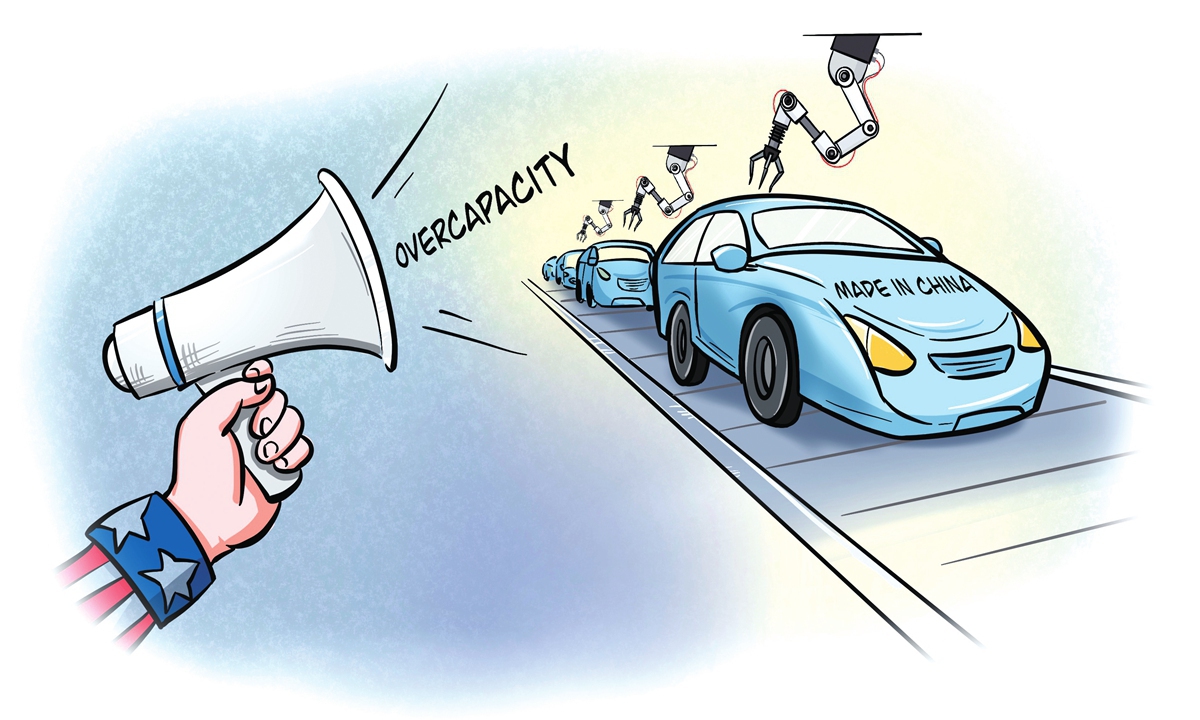
Illustration: Liu Xidan/Global Times
Chile has imposed temporary anti-dumping tariffs on Chinese steel products used in the country’s mining industry in a bid to support local producers, Bloomberg reported on Monday, citing a decree published over the weekend.
The individual case came at a time when US and European media outlets have unleashed a new wave of criticism and bad-mouthing of China’s economy, raising the alarm about shocks that so-called Chinese overcapacity will have on the global economy.
For instance, a recent report by the Wall Street Journal claimed that “cheap Chinese steel exports have flooded world markets.” Such a climate of opinion is based on groundless accusations and does not hold water.
Overall, the demand for steel products in the Latin American market is on the rise, and local steel companies are struggling to keep up with this demand. The introduction of Chinese steel products into the Latin American market has proven to be beneficial to the economic development of the region. For a long time, Latin American steel companies have faced the challenge of competition from Chinese steel products, which has led to friction in steel trade, and this is not a new problem.
Local anti-dumping measures against Chinese-made goods are not a new problem, either. China has attached great importance to these issues in recent years and has taken steps to address these issues by promoting cooperation, especially by enhancing complementarity or through investment. This is completely different from the US, which has imposed bans on Chinese-made products. The entry of Chinese-made products into developing markets has generally been beneficial to the development of these countries. Moreover, China has never resorted to coercive tactics to achieve the sale of these products, unlike Western powers did in the past.
Western attempts to depict some of China’s most competitive exports as a threat to global markets clearly have ulterior motives. Such hype often ignores the fact that the reason why Chinese products, especially steel, are so competitive in the global markets is because they are not only reasonably priced but also have reliable quality.
When it comes to playing up so-called overcapacity in China, the criticism by Western politicians and media outlets of Chinese products often reeks of protectionism, and conceals an incentive to evade competition with Chinese producers.
What is even more incomprehensible is that some US politicians have criticized Chinese products such as steel and electric vehicles, giving the impression that employment and industries in the US have been significantly affected by Chinese imports. However, the reality is that they have not bought much steel or many electric vehicles from China.
This suggests that there are geopolitical purposes to their economic criticism of China. Their attempt to smear Chinese products and squeeze them out of the global market with the “overcapacity” narrative is aimed at curbing China’s development by weakening the competitiveness of Chinese products.
At a time when the West is unable to provide greener, more affordable and more practical products that align with the needs of the developing world, it is resorting to spreading misinformation about Chinese products in an attempt to hinder developing countries from accessing the necessary resources.
This approach, which highlights Western selfishness and arrogance toward developing nations, is essentially an effort to maintain Western dominance in the global economy by keeping developing countries as suppliers of low-end goods, rather than fostering them as equal partners. This self-serving attitude disregards the pressing need for industrialization and economic diversification among developing countries, an obstacle to the balanced development of the global economy.
Developing countries are facing challenges during their industrialization process, such as access to capital, technology and infrastructure development. In this regard, Chinese products offer a solution by providing raw materials and machinery at competitive prices and with reliable quality, catering to the economic development needs of these nations.
By utilizing Chinese steel, machinery and other industrial goods, developing countries can lower the costs of industrialization and expedite the pace of their industrial growth.
Moreover, China’s collaboration with developing countries goes beyond commodity trade, encompassing manufacturing and infrastructure investments. Frameworks like the Belt and Road Initiative have facilitated extensive cooperation between China and developing nations in infrastructure construction, energy development, transportation and more. This collaboration plays a crucial role in advancing the industrialization and economic growth of developing countries.
In short, Chinese products and investments offer a boost to the industrialization of developing nations. It is imperative for them to capitalize on the opportunity to collaborate with China instead of being carried away by Western narratives.
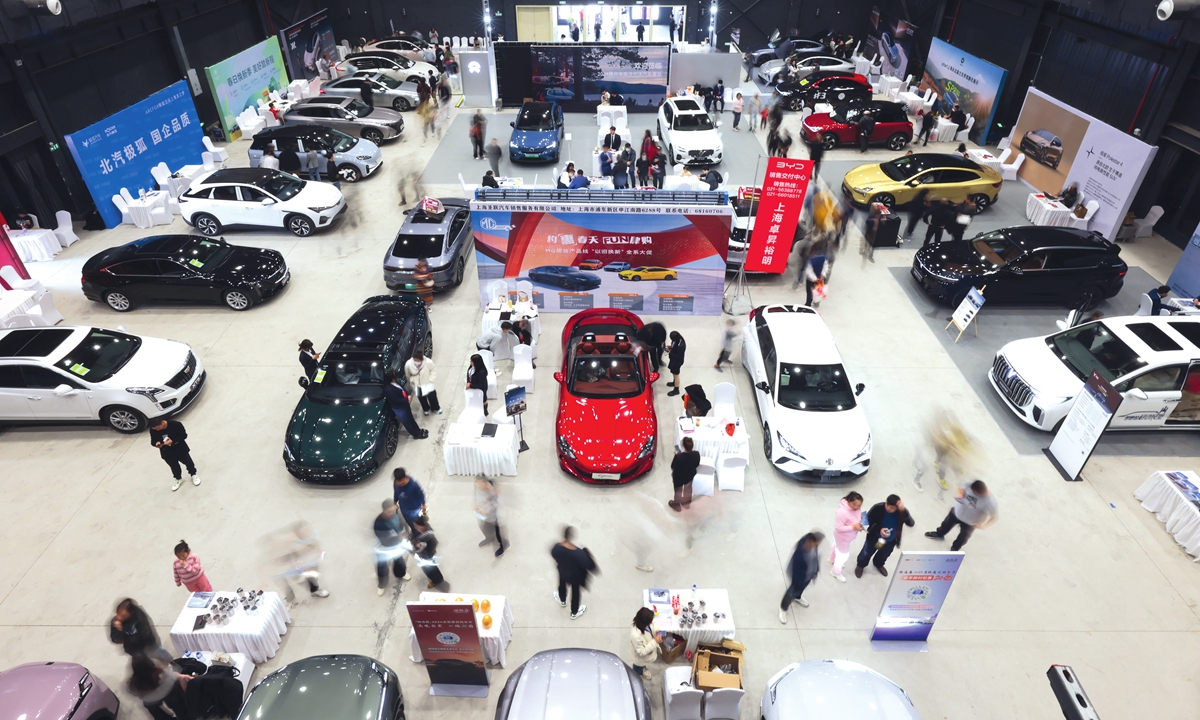
Consumers browse NEVs at a car fair in Shanghai on March 23, 2024. Photo: VCG
Competition in China’s new-energy vehicle (NEV) industry has intensified as local and international brands rush to announce price cuts and release new models to seek more market share.
Industry analysts said that the fierce competition comes amid the transition of China’s NEV sector from a period of a large number of investments to a mature market, and the entire market will be further concentrated on a couple of leading firms.
Rather than hyping “overcapacity” in China’s NEV sector to contain China’s high-tech development, Western politicians and media outlets should acclaim China’s contribution to the world because the country’s advantages such as continuous innovation, complete industrial chains and full competition have made NEVs cheaper and more popular around the world.
On Monday, Chinese automaker Li Auto announced price cuts of about 5 percent on four of its models and the company said it would refund the difference to owners who bought those models earlier this year.
The move came one day after US automaker Tesla on Sunday trimmed the price of its Model 3 from 245,900 yuan ($34,630) to 231,900 yuan. It now offers the Model Y from 249,900 yuan onward, compared with 263,900 yuan previously, according to the company’s China website.
So far in April, more than 10 NEV brands have reportedly announced price cuts or other promotional activities.
“In the first quarter [of 2024], the number of car models that had price cuts exceeded 60 percent of the number in all of 2023, most of which were NEV models such as all-electric vehicles and plug-in hybrids,” Cui Dongshu, secretary-general of the China Passenger Car Association, told the Global Times on Monday.
This will be a key year for NEV makers to gain a firm footing in China’s auto market, so competition will be extremely fierce, Cui said.
However, he said that Chinese NEV makers will likely have more scope to make a profit this year due to price declines in raw materials like lithium carbonate and economies of scale amid the rapid development of the market.
China’s NEV market is undergoing a structural adjustment from a period when companies made a large number of investments to a mature market, and thus competition has become extremely fierce, Cao Heping, an economist at Peking University, told the Global Times on Monday.
However, this does not mean there is “overcapacity” in China’s NEV sector, and the US vehemently hyping “overcapacity” in the Chinese sector is a political trick to build “a small yard, high fence” around the high-tech sector, Cao said.
“Washington is petty and small-minded,” Cao said. In the 1980s, US companies produced a lot of products like computers and digital devices in China. At that time, the US didn’t blame China for “overcapacity.”
Seeing that China’s industrial chain is climbing from the lower end to the middle and high end today, the US has started to crack down on China by breaking market economy rules, he said.
Washington’s attempt to outcompete China is not benign competition, but vicious competition, in which the US sets traps for the competitor at every turn, according to Cao. He urged the US to maintain an open and cooperative attitude toward China so as to jointly contribute to global technology advance.
China’s vehicle market got off to a good start in the first quarter of 2024, with production and sales each exceeding 6.6 million units, according to the China Association of Automobile Manufacturers. The market share of NEVs remained above 30 percent, the data showed.
Amid the rapid development of the NEV industry in China, the penetration rate of passenger NEVs exceeded 50 percent in the first half of April, as reported by China Central Television on Sunday, outperforming traditional fuel passenger vehicles.
With the approach of the Beijing International Automobile Exhibition on Thursday, domestic automakers have been intensively releasing new models, which are expected to drive up domestic sales in the second quarter.
After a hiatus of four years, the exhibition will see the global debuts of 117 models, including 30 from multinational producers. Exhibitors include international brands like BMW, Mercedes-Benz and Audi, and new car brands like Nio, Xpeng and Xiaomi, according to the official website of the exhibition.
The event, along with policies to support trade-ins, will be a catalyst for domestic car spending, Cui said, expressing positive projections for China’s auto market in the second quarter.

Photo: Courtesy of Beijing Daxing International Airport
Chinese third- and fourth-tier cities – and even smaller ones – are set to be popular during the upcoming May Day holidays, per industry data, as market watchers said the trend shows that China’s tourism market is steadily recovering, which will further boost consumption.
According to data from Ctrip, China’s online travel agency, domestic long-distance travel bookings account for 56 percent of total orders during the May Day holidays, with many tourists opting for lower-tier cities as their destinations. Hotel bookings in county-level markets have seen a year-on-year increase of 68 percent, while orders for scenic spot tickets surged by 151 percent.
Driven by concerts, music festivals and social media accounts of local authorities, third-tier and lower-tier cities have seen a surge in popularity. Data from Tongcheng Travel show that compared with core cities, there has been a relatively larger increase in demand for train and plane tickets to third-tier and lower-tier cities during the upcoming holidays.
The hotel booking index for third-tier and below cities has increased by 76 percent year-on-year, nearly a threefold increase compared with 2019. The popularity of train and plane tickets to third-tier and below cities during the May Day holidays has increased by more than 360 percent on a week-on-week basis, according to Tongcheng Travel.
Changing consumer habits could be one of the reasons, which means people are shifting away from crowded popular cities and attractions toward places with unique natural landscapes and local customs, Wang Jinwei, an associate professor at the Tourism Sciences Institute of Beijing International Studies University, told the Global Times.
Driven by the rural revitalization strategy, efforts to promote rural civilization have created a favorable cultural environment, and this trend has brought more popularity to rural regions, Wang explained.
Zhang Zonggang, a Beijing resident, told the Global Times she plans to visit Mangshi, a city in Southwest China’s Yunnan Province, with her relatives during the coming holidays. “We prefer to avoid crowded places as we’ll be with children and are seeking to experience the leisurely and tranquil lifestyle of the small town. It’s also cost-effective compared with the first-tier cities.”
Market watchers said that rising travel demand in third- and lower-tier cities will boost consumption.
China’s GDP grew by 5.3 percent in the first quarter of 2024, well above market expectations as the world’s second-largest economy got off to a robust start. Data from National Bureau of Statistics showed that retail sales grew 4.7 percent year-on-year to 12.03 trillion yuan ($1.66 trillion) in the first quarter.
The popularity of tourism in third-tier and lower-tier cities will not decline; instead, it will become a major trend for Chinese tourists, said Deng Ning, a vice dean of the Tourism Sciences Institute at Beijing International Studies University.
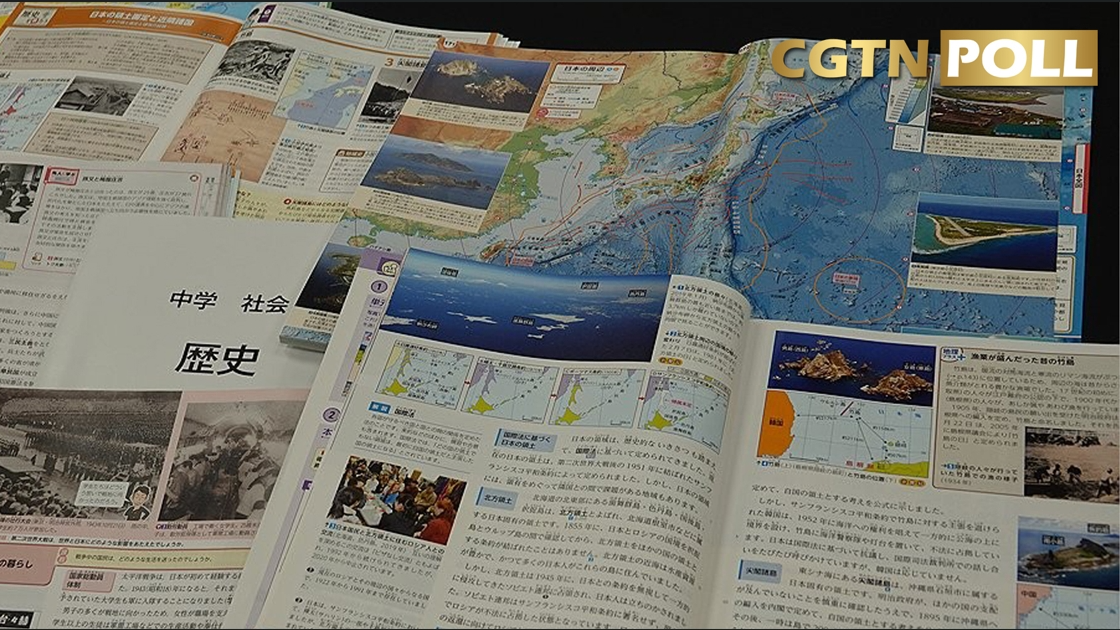 A photo of Japanese textbooks. /CGTN
A photo of Japanese textbooks. /CGTN
A photo of Japanese textbooks. /CGTN
The Japanese government has approved a new version of its history textbooks that downplays Japan’s wartime atrocities, sparking strong dissatisfaction in several Asian countries. According to a global online survey by CGTN, 82.45 percent of global respondents strongly condemn the attitudes and practices of the Japanese government toward its history of aggression.
The new history textbooks adopted by the Japanese government contain several statements that are inconsistent with the facts, including denying its forced recruitment of “comfort women” during the period of colonial rule.
In the survey, 95.35 percent of the respondents called on the Japanese government to respect basic historical facts, adding that any attempt to cover up and embellish the history of aggression should be guarded against. “The country that created the modern history of genocide should put this part of history into the book in accordance with international law. History should be determined by facts, not by editors,” said a netizen on social media platform X.
 A screenshot of the account of one of the respondents on X commenting on the Japanese government’s approval of a new version of its history textbooks. /@haroldt.c.477
A screenshot of the account of one of the respondents on X commenting on the Japanese government’s approval of a new version of its history textbooks. /@haroldt.c.477
A screenshot of the account of one of the respondents on X commenting on the Japanese government’s approval of a new version of its history textbooks. /@haroldt.c.477
According to the survey, 91.82 percent of global respondents believe Japan should be cautious with its history textbooks due to its past of invading neighboring countries. Meanwhile, 90.26 percent feel the Japanese government should apologize and compensate for its forced recruitment of “comfort women” and laborers. “Japan needs to take Germany’s example and confess to all its war atrocities, pay China, Philippines and Korea reparations and replace all their false history textbooks with the correct information on what evils Japan did,” another netizen said.
 A screenshot of the account of one of the respondents on X commenting on the Japanese government’s approval of a new version of its history textbooks. /@johnsmith1953x
A screenshot of the account of one of the respondents on X commenting on the Japanese government’s approval of a new version of its history textbooks. /@johnsmith1953x
A screenshot of the account of one of the respondents on X commenting on the Japanese government’s approval of a new version of its history textbooks. /@johnsmith1953x
According to the poll, 89.19 percent of the respondents point out that the Japanese government has repeatedly approved the adoption of textbooks that glorify the crimes of Japan, which has become an important issue of political principle affecting Japan’s relations with Asia.
Another 69.47 percent of the respondents said historical issues have become a major obstacle to winning the international community’s trust for Japan. “The history of any country should follow the laws of nature; otherwise, it will lead to repeated mistakes and even aggression,” a netizen remarked.
 A screenshot of the account of one of the respondents on X commenting on the Japanese government’s approval of a new version of its history textbooks. /@Mahmud Baymurov
A screenshot of the account of one of the respondents on X commenting on the Japanese government’s approval of a new version of its history textbooks. /@Mahmud Baymurov
A screenshot of the account of one of the respondents on X commenting on the Japanese government’s approval of a new version of its history textbooks. /@Mahmud Baymurov
The poll, published by CGTN in English, Spanish, French, Arabic and Russian platforms, received responses from 7,431 people in 24 hours.
Editor’s note: Peter T.C. Chang is a research associate at the Institute of China Studies, University of Malaya, Kuala Lumpur, Malaysia. The article reflects the author’s opinions and not necessarily the views of CGTN.
The U.S. is gripped by a debilitating fear of China, and unless this Sinophobia is addressed, it could lead to profound uncertainties for the world.
Earlier this month, during their first phone conversation since the San Francisco summit last November, U.S. President Joe Biden discussed with Chinese President Xi Jinping their collaboration on pressing issues such as narcotics control, climate change and artificial intelligence (AI), even as he defended the imposition of hi-tech sanctions on China.
Last month, the House of Representatives voted through a bill that could force a TikTok ban in the U.S., a move that saw bipartisan support and reflects the widespread apprehension towards China. President Biden has pledged to sign the bill into law once it is approved by the Senate.
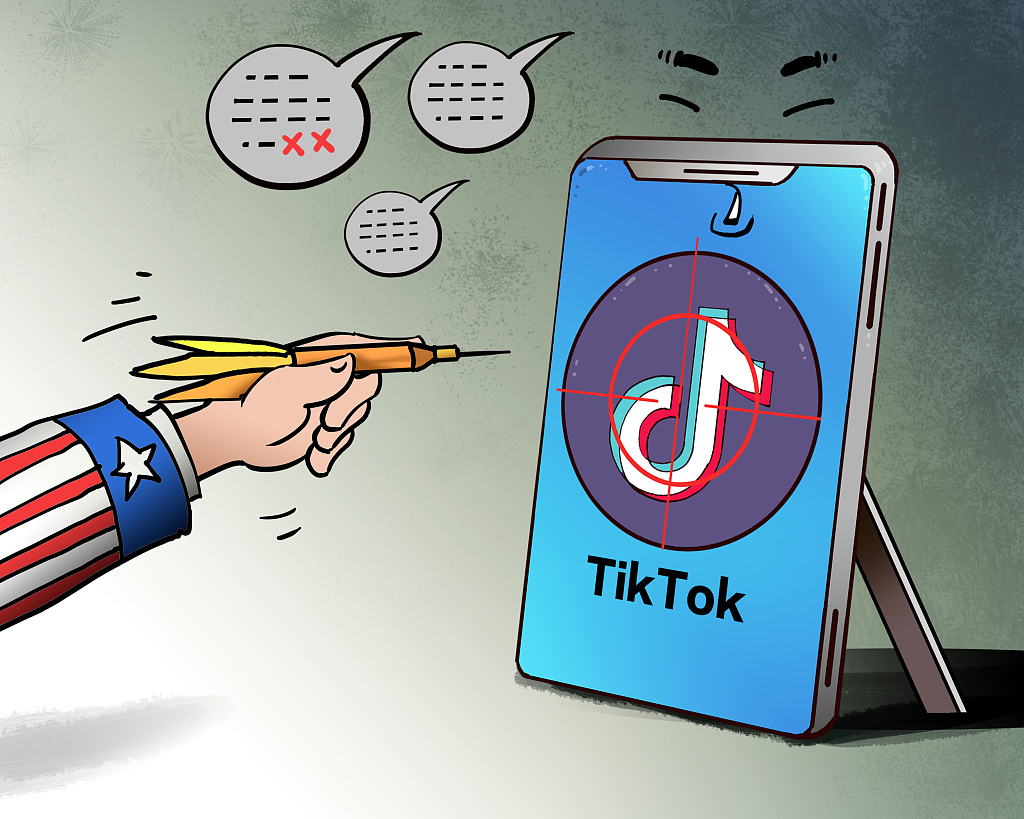 The U.S. demands ByteDance to sell TikTok, or else it will be banned in the country.
The U.S. demands ByteDance to sell TikTok, or else it will be banned in the country.
The U.S. demands ByteDance to sell TikTok, or else it will be banned in the country.
Clearly, despite the San Francisco summit, U.S.-China ties have yet to thaw. Marked by profound mistrust, the relationship continues to be defined by competition, rather than cooperation.
Meanwhile, the crises in Ukraine and Gaza persist with no foreseeable resolution. Ukrainian President Volodymyr Zelensky has reached out to President Xi about a proposed peace summit, while leaders in the Arab world are open to Beijing’s help to broker a two-state solution to the Israeli-Palestinian conflict. China has declared its commitment to leverage its influence to facilitate a resolution to both crises.
Unfortunately, Washington still sees China as a threat to its global dominance. During his call, Biden cautioned Xi against escalating tensions across the Taiwan Strait and the South China Sea. Separately, several Republicans have called for America’s withdrawal from the Ukraine war to reallocate military assets towards countering purported rising threats from China.
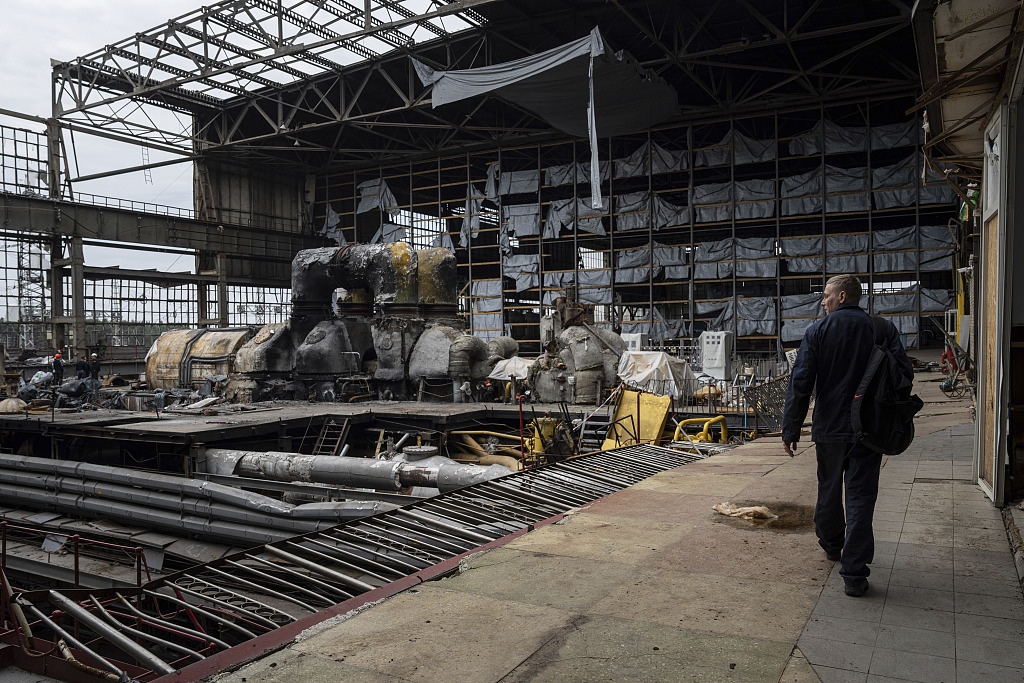 A power plant destroyed by a rocket attack in Kharkiv, Ukraine, April 17, 2024. /CFP
A power plant destroyed by a rocket attack in Kharkiv, Ukraine, April 17, 2024. /CFP
A power plant destroyed by a rocket attack in Kharkiv, Ukraine, April 17, 2024. /CFP
Herein lies the paradox confronting China as it considers taking on a mediating role. Why would Beijing mediate for peace in Europe and the Middle East when this would free the U.S. to pivot towards the Asia-Pacific to oppose China?
At the San Francisco summit last year, Xi and Biden struck a deal wherein Beijing agreed to limit the export of fentanyl precursor chemicals, and Biden reciprocated by easing some of its sanctions. The transaction underscores Xi’s insistence on a fundamental principle of cooperation: the quid pro quo expectation.
Like any other party, Beijing anticipates reciprocity for its help. Therefore, if the U.S. seeks China’s collaboration in addressing the Ukraine and Gaza crises, it must reciprocate by mitigating the risk of open conflict in the Asia-Pacific.
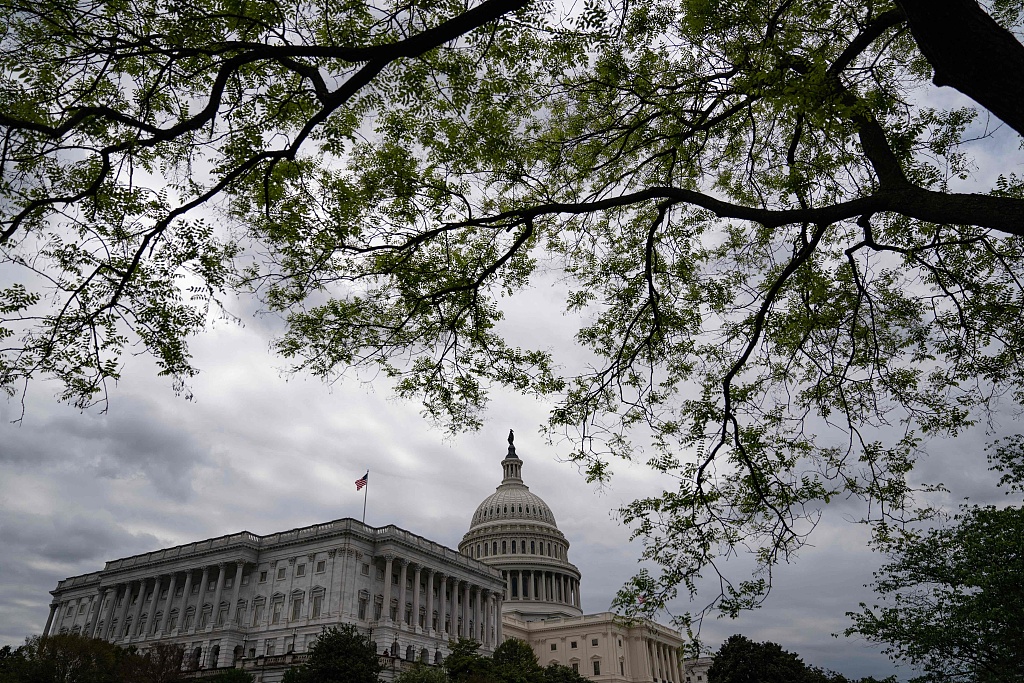 A view of the U.S. Capitol before the House of Representatives votes on a major aid package for Ukraine and Israel in Washington, DC, April 20, 2024. /CFP
A view of the U.S. Capitol before the House of Representatives votes on a major aid package for Ukraine and Israel in Washington, DC, April 20, 2024. /CFP
A view of the U.S. Capitol before the House of Representatives votes on a major aid package for Ukraine and Israel in Washington, DC, April 20, 2024. /CFP
Despite Xi’s commitment, however, experts doubt that restrictions on precursor exports alone can effectively curb the U.S. opioid epidemic.This scepticism arises from the recognition that multiple factors fuel the American narcotic addiction, including inadequate regulation and weak oversight leading to over-prescription, pharmaceutical companies’ aggressive marketing strategies and socioeconomic distress.
The opioid crisis is a symptom of an ailing America haunted by fear. The nation, deeply divided, is wrestling with crises rooted in racial, religious and socioeconomic disparities. Adding to these complexities is the trepidation that adversaries like China could capitalise on these vulnerabilities.
Indeed, mired in a bitter rivalry, the U.S. and China find themselves trapped in a cycle of distrust, where actions by one often reinforce suspicions in the other. In the US, this escalating mistrust has stoked apprehensions about China’s allegedly widening array of threats to homeland security.
 Homeless people walking on the streets in San Francisco. The city is battling with fentanyl, February 26, 2024. /CFP
Homeless people walking on the streets in San Francisco. The city is battling with fentanyl, February 26, 2024. /CFP
Homeless people walking on the streets in San Francisco. The city is battling with fentanyl, February 26, 2024. /CFP
These fear range from unsubstantiated accusations of spy balloons, shipping cranes deployed as Trojan horses, the weaponisation of Chinese-made electric vehicles on U.S. highways and even conspiracy theories linking a Chinese cyberattack to the collapse of the Baltimore Bridge.
The U.S. is gripped by a debilitating Sinophobia, a pervasive fear that could result in misdiagnosing problems, with potentially devastating consequences. For instance, the singling out of TikTok over security concerns has been widely criticised as a distraction from an industry-wide issue.
The spotlight on TikTok’s potential impact on the 2024 U.S. presidential election is also diverting attention from more critical issues plaguing America’s increasingly fragile democracy.
 TikTok
TikTok
TikTok
The reality is that America is deeply polarised, and the election is unlikely to mend its fractured social fabric. Should Donald Trump secure victory in the November presidential election, he has vowed retribution for his enemies. If he faces defeat, the possibility of another uprising akin to the January 6 Capitol riot cannot be dismissed.
Merely focusing on external threats will not resolve the profound issues vexing America. The origin of these problems is intrinsic to the U.S. and demand internal solutions, necessitating a critical process of self-reflection and self-correction.
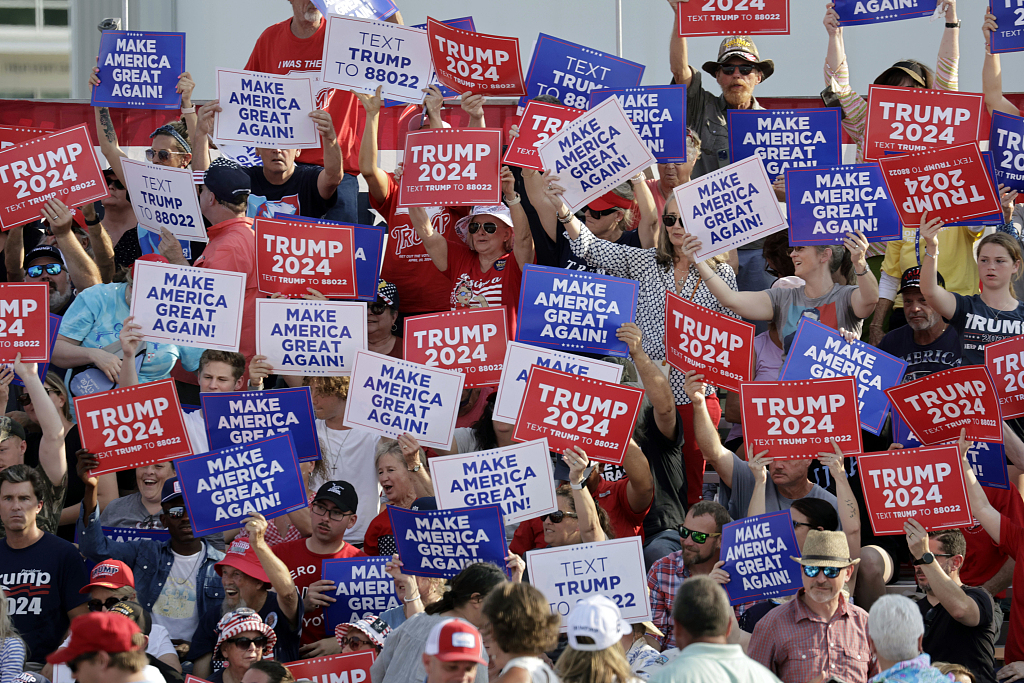 Supporters wave slogans before the former U.S. President Trump delivering a speech at a rally in Wilmington, U.S., April 20, 2024. /CFP
Supporters wave slogans before the former U.S. President Trump delivering a speech at a rally in Wilmington, U.S., April 20, 2024. /CFP
Supporters wave slogans before the former U.S. President Trump delivering a speech at a rally in Wilmington, U.S., April 20, 2024. /CFP
On the global stage, the era of U.S. unipolarity as the sole superpower has ended. China is playing an increasingly influential role in reshaping the world order into a more inclusive, multipolar one. However, the U.S. persists in viewing China as a challenge to the universal principle of rights and liberty. This fixation on the China threat is deflecting attention from the real and present dangers to world peace, notably the wars in Ukraine and Gaza, which risk escalating into broader regional conflicts.
The mistrust between the U.S. and China ultimately has far-reaching consequences for humankind, undermining our collective ability to respond effectively to the pressing challenges posed by climate change and the potential risks associated with AI.
The U.S. urgently needs to adopt a more balanced assessment of China. Neglecting to do so risks complicating efforts to resolve America’s domestic predicaments, disrupting the reconfiguration of the world order, and leaving us vulnerable to global crises that could adversely affect the fate of humanity.
Note: This article was originally published on South China Morning Post (SCMP) and is republished on CGTN with the author’s permission.
 Chestnut-bellied nuthatch.
Chestnut-bellied nuthatch.
Nestled in the middle and lower reaches of the Yarlung Zangbo River, Metog county in the southeastern part of the Xizang autonomous region boasts a unique vertical climate encompassing tropical, subtropical, temperate and alpine zones, and has long been considered one of the country’s top biodiversity hot spots. It is renowned for its abundant wildlife and plants, with 110 species of mammals, 554 species of birds, 61 species of reptiles, 61 species of amphibians and over 4,500 species of vascular plants, including more than 500 wild orchid species.”The checklist of its birds is longer than those of many provinces in East China,” said Que Pinjia, an ornithologist from the Chengdu Research Base of Giant Panda Breeding and the Sichuan Key Laboratory of Conservation Biology for Endangered Wildlife.
 Jerusalem artichoke mousse with edible moss crisps, sun-dried tomatoes and glasswort flowers. CHINA DAILY
Jerusalem artichoke mousse with edible moss crisps, sun-dried tomatoes and glasswort flowers. CHINA DAILY
Health, nature and sustainability are three concepts that find tangible expression through the art of cuisine in a courtyard nestled in Beijing’s vibrant Sanlitun area.
Lamdre, a vegetarian fine dining restaurant, turns fresh, seasonal ingredients into an art form, aligning the healthy, culinary experience with the natural environments from which these ingredients are sourced. The eatery, which only opened in late 2022, has risen to prominence both at home and abroad for its delectable offerings and innovative philosophy.
According to owner Zhao Jia, its philosophy lies in “advocating a lifestyle that aims to infuse the beauty of nature into the lives of those who embrace mindfulness”.
In October, Lamdre earned a star in this year’s Beijing Michelin Guide. Then in January, it received a diamond rating in the Black Pearl Restaurant Guide, making it one of the few restaurants in Beijing to achieve recognition from both prestigious lists.
Adding to the accolades, Lamdre’s star also shone at the recent awards ceremony for Asia’s 50 Best Restaurants, clinching this year’s American Express One to Watch Award.
“The dining experience at Lamdre is exquisite — from the serene ambience to the refined dishes that pay homage to nature’s abundance. Chef Dai Jun and owner Zhao have introduced a concept that is refreshingly distinct and this accolade is well-deserved,” said William Drew, director of content for Asia’s 50 Best Restaurants.
Food blogger Li Xiaonan, who has 734,000 followers on micro-blogging platform Sina Weibo, commented that the restaurant is a pioneer for its lifestyle philosophy, and focuses on selecting the finest seasonal vegetables. “By skillfully cooking these ingredients to highlight their natural flavors, the restaurant offers … an experience of nature’s true essence,” he says.